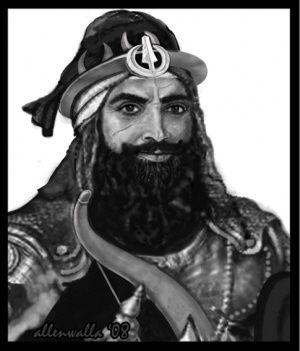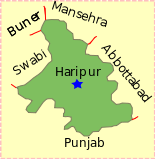Hari Singh Nalwa

Sardar Hari Singh Nalwa (1791-20.4.1837[1]) (हरीसिंह नलुआ), the great Utpal/Uppal gotra Jat warrior was born at Gujranwala and was the Commander-in-chief of Maharaja Ranjit Singh. His father was a warrior in Maharaja Ranjit Singh's army. Sir Henry Griffin called Nalwa the "Murat of the Khalsa".
His conquests
In 1816, Tits and Bits wrote an editorial piece in Britain, in which it was asserted that had Nalwa the resources and the artillery of the British, he would have conquered the East entirely. This most famous of the great Sikh generals can count the following conquests: Kasur (1807), Sialkot, Kashmir (1814), Multan (1818), Peshawar (1827). He held Kashmir and Peshawar as its governor in 1834. Nalwa was the only person whose name was minted on the currency of Punjab; today the Hari Singh rupee can be found in museums in India. He died on 20 April 1837 in war with Peshawar.[2]
Hari Singh earned the name 'Nalwa' after he killed a tiger, as Baron Hugel, a European traveller writes in "Travels in Kashmir & the Punjab: " I surprised him by knowledge whence he had gained the appellation of Nalwa, and of his having cloven the head of a tiger, who had already seized him as its prey. He told the Diwan to bring some drawings and gave me his portrait, in the act of killing the beast."
Nalwa was dishonourably murdered in an ambush from behind. It is believed that two Dogras that were in Maharaja Ranjit Singh's cabinet (secretly in the pay of the British and the Afghans) were behind the attack. An undelivered letter to the Maharajah asking for assistance from Nalwa was later found in the possession of one of these Dogras. Bibi Harshan Kaur then made her much heralded walk of valour from Jamrud to Peshawar carrying news that Jamrud was under attack, but it was too late for Nalwa. He died when 60,000 troops attacked his fort. The sikhs told him that they were about to attack as they thought he had died however he was still alive. He then went on to the balcony and rested his Teer (arrow) in to his ear and died whilst the fight was on. Just seeing Hari Singh was enough to scare the forces away who trampled their own people.

Haripur in Hazara Division in the North-West Frontier Province of Pakistan is named after Hari Singh Nalwa.
His conversations
Nalwa had a number of conversations with British, French and German royalty, in which they conversed as equals. Baron Charles Hughart remembers him fondly in his memoirs on travelling through the Peshawar region, in which he was given a portrait of Nalwa from the man himself. Hari Singh Nalwa spoke, wrote and read Persian as well as the Indian languages, and was familiar with world politics, including details about the European states. If Nalwa had lived, many feel that the British would never have been able to hold or enter the Punjab. He beat the Afghans at Attock Fort and held Afghanistan, something which the British failed to do. As Sir Lepel Griffin states: "Hari Singh Nalwa, the man with the terror of whose name Afghan mothers used to quiet their fretful children..." As was often the case with his battles, he did so at the request of Hindus living in this region, for they prevailed upon him to free them from the religious tax imposed upon them by the Mughal rulers.
Nalwa was the consummate example of the Sikh-saint soldier, and India owes much to his strategic genius. His descendants still live privately in India and abroad today. This tale runs counter to the story of Maharajah Ranjit Singh's line, which was forever destroyed by the British, who abducted his children and took them to England, where they were held hostage against the threat of India rising against British rule. Nalwa was the senior most member of Ranjit's court, and one of his grandsons struck out against British rule while a cadet in the Indian army, only to be brutally suppressed. The tremendous and legendary spirit embodied by Nalwa continued to be denied for some 200 years, while the British held India, the crowning glory of its Empire, ransom, and continued to bleed it of wealth and to kill off both talent and outspokenness in the great Indian family lineages.
Nalwa the Greatest
In 1881, British Newspapers compared many great generals of the past and came with the following conclusion:
"Some people might think that Napoleon was a great General. Some might name Marshall Hendenburgh, Lord Kitchener, General Karobzey or Duke of Wellington etc. And some going further might say Halaku Khan, Genghis Khan, Changez Khan, Richard or Allaudin etc. But let me tell you that in the North of India a General of the name of Hari Singh Nalwa of the Sikhs prevailed. Had he lived longer and had the sources and artillery of the British, he would have conquered most of Asia and Europe…."
Brief introduction by Thakur Deshraj
Book - जाट इतिहास:ठाकुर देशराज (पृष्ठ 296)
यह गुजरानवाला में पैदा हुआ था। लड़कपन में महाराज के साथ खेला करता था। महाराज को उससे बड़ा स्नेह था। 1805 ई० में मामूली खिदमत से तरक्की देकर इसे महाराज ने 800 प्यादों का सवार बनाया। अपनी समस्त आयु उसने महाराज के लिए लड़ाई में बिताई। सरदार हरीसिंह नितान्त सैनिक व्यक्ति था। उसे एक बार काश्मीर का सूबेदार बना कर भेजा गया। प्रबन्ध के तौर पर वह असफल रहा। उसने यूसुफजई के पठानों को विजय किया। दुरबन्द और जहांगीरा के पास उनके साथ लड़ाइयां कीं। अटक के पहाड़ी मैदान में पठानों के दांत खट्टे किए। उसका समय अधिकांश में पठानों के साथ लड़ाइयों में बीता। अफरीदी उसने हराये। हजारा के कबीलों को उसने कुचला। कुं० नौनिहालसिंह के साथ पेशावर पर चढ़ाई करके उसे जीता। पठानों को पेशावर से खदेड़ दिया। जमसद के किले पर कब्जा किया। खैबर की घाटी को पार करके अफगानों को इतना भयभीत किया कि उसके नाम से पठान कांपने लगे। लेकिन इसी लड़ाई सन् 1837 ई० में उसके गहरा जख्म आया, जिससे उसकी मृत्यु हो गई। उसकी मृत्यु भी उसकी बहादुरी की वजह से हुई। उसका साहस अनुपम था। वह पठानों का तो जानी दुश्मन था। वह पठानों को बुजदिल और नीच समझता था। पठान उसके नाम से कांपते थे। पेशावर, काबुल इत्यादि में अब भी उसका नाम बच्चों को डराने के लिए प्रयोग किया जाता है। जिस तरह भारत में माताएं बच्चों को रोने से चुप कराने के लिए हौआ का डर दिखाती हैं, उसी तरह काबुल, पेशावर की पठान स्त्रियां बच्चों को रोने से बन्द करने के लिए कहती हैं - “खुफता वाशिद हरी आयद” यानी 'बच्चे, चुप हो जाओ, हरी आता है।' एक हिन्दी कवि ने हरीसिंह के लिए कहा है - मारि-मारि यवनों का बनाय दिया भुरता।
सरदार हरीसिंह के अन्दर आकर गुरु गोविन्दसिंह की भविष्यवाणी पूरी होती है। वे कहा करते थे - 'चिड़ियों से मैं बाज मराऊं। तब ही गोविन्दसिंह पाऊं।' गुरु गोविन्दसिंह के समय में मुसलमान अपने को बाज और हिन्दुओं को चिड़िया समझते थे। वास्तव में वे बहुत बुजदिले हो गए थे। वे मरने और मारने दोनों से डरते थे। गुरु गोविन्दसिंह ने उनके दिल से मौत का डर दूर करके उन्हें निर्भयता पूर्वक मरना सिखाया और फिर वीरबन्दा तथा महाराज रणजीतसिंह ने उन्हें मारना सिखाया।
जाट इतिहास:ठाकुर देशराज, पृष्ठान्त-296
References
- General Hari Singh Nalwa: Builder Of The Sikh Empire Author: A S Sandhu
Back to The Rulers

